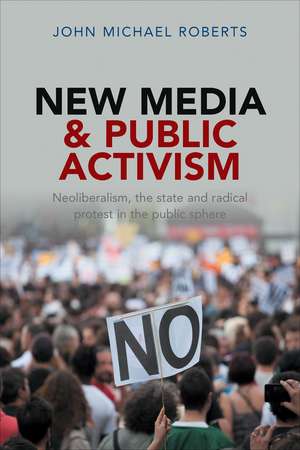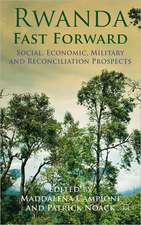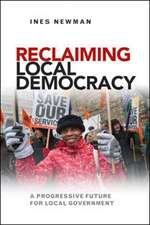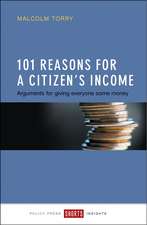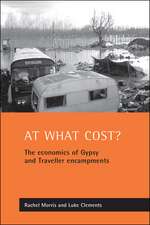New Media and Public Activism: Neoliberalism, the State and Radical Protest in the Public Sphere
Autor John Michael Robertsen Limba Engleză Paperback – 9 sep 2014
The Arab Spring was but the most prominent example of political activism that made extensive use of social media—everything from petitions to constituent communications have been affected by the rise of new communications technologies. But in New Media and Public Activism, John Michael Roberts poses a troubling question: Is this activism actually new and effective, or are we instead being transformed into subjects of online consumption and orderly surveillance, rather than being committed social and political campaigners? Taking a political economy perspective, Roberts offers an indispensable guide to understanding the relationship between the state, new media activism, and neoliberal practices.
| Toate formatele și edițiile | Preț | Express |
|---|---|---|
| Paperback (1) | 323.62 lei 3-5 săpt. | |
| Bristol University Press – 9 sep 2014 | 323.62 lei 3-5 săpt. | |
| Hardback (1) | 775.73 lei 6-8 săpt. | |
| Bristol University Press – 9 sep 2014 | 775.73 lei 6-8 săpt. |
Preț: 323.62 lei
Nou
Puncte Express: 485
Preț estimativ în valută:
61.92€ • 67.48$ • 52.18£
61.92€ • 67.48$ • 52.18£
Carte disponibilă
Livrare economică 02-16 aprilie
Preluare comenzi: 021 569.72.76
Specificații
ISBN-13: 9781447308218
ISBN-10: 1447308212
Pagini: 224
Dimensiuni: 152 x 229 x 15 mm
Greutate: 0.36 kg
Ediția:New.
Editura: Bristol University Press
Colecția Policy Press
ISBN-10: 1447308212
Pagini: 224
Dimensiuni: 152 x 229 x 15 mm
Greutate: 0.36 kg
Ediția:New.
Editura: Bristol University Press
Colecția Policy Press
Notă biografică
John Michael Roberts is a senior lecturer in sociology and communications at Brunel University, London.
Cuprins
Introducing New Media and Public Activism
Creative Digital Capitalism? Exploitation, Information and Finance
Neoliberalism and New Public Management: The Rise of the Competent Public Sphere
E-democracy and Public Deliberation in the Competent Public Sphere
Social Media and the Neoliberal Subject
Zoning Public Space 1: Hybrid Surveillance and State Power
Zoning Public Space 2: Gentrification, Community Publics and CCTV
Global Social Movements: Beyond the Competent Public Sphere?
Conclusion: The Occupy Movement, Community Activism and ‘Incompetent’
Public Spheres
Creative Digital Capitalism? Exploitation, Information and Finance
Neoliberalism and New Public Management: The Rise of the Competent Public Sphere
E-democracy and Public Deliberation in the Competent Public Sphere
Social Media and the Neoliberal Subject
Zoning Public Space 1: Hybrid Surveillance and State Power
Zoning Public Space 2: Gentrification, Community Publics and CCTV
Global Social Movements: Beyond the Competent Public Sphere?
Conclusion: The Occupy Movement, Community Activism and ‘Incompetent’
Public Spheres
Recenzii
“John Michael Roberts is one of the first to offer a comprehensive and intelligent analysis of new media's implications for the public sector, from activism to organized labor. His book is a must read for anyone interested in the role of communication and media technologies in the blurring of boundaries between private, public and commercial."
“A rich critique concerning the implications of digital media in contemporary thought, governance, and resistance. Roberts has produced a provocative and accessible book that reinvigorates debates concerning labour, the state, and contradiction in the context of neoliberal capitalism.”
“This is an extremely good book, which contains a range of fascinating arguments and ideas about new media public spheres.”
“John Michael Roberts presents an innovative critical exploration of new media and its relationship to public activism. Drawing on a wealth of empirical case studies and everyday examples, he not only shows the continual relevance of critical theory for an investigation of digital democracy but with equal force demonstrates the importance of taking state power and neoliberalism seriously in any analysis of new media activism and dissent.”
